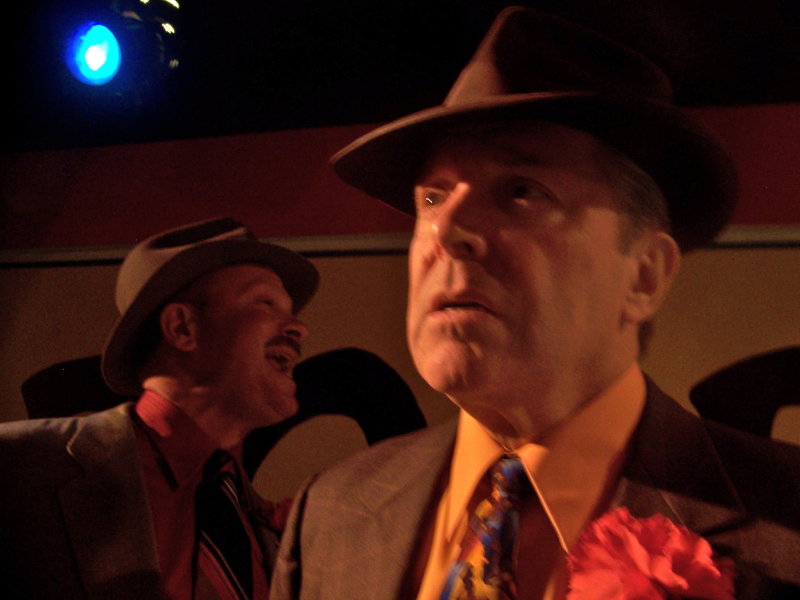We tend to believe that size matters when it comes to staging the Shakespearean canon of plays. Big casts. Big performances. Big budget for costumes. And theater companies hope big audiences.
Two Milwaukee stage troupes are testing that assumption in the next few weeks. The Boulevard Theatre will produce "All's Well That Ends Well" in its Bay View storefront Feb. 10 to March 14, and Off the Wall Theatre will mount "Macbeth" in its intimate Downtown venue Feb. 18 to March 7.
Boulevard normally seats 50 persons in its space, but it will reduce that number by 10. Off the Wall usually accommodates from 50 to 70 patrons, depending on the physical size of the production, but it will shrink its audience to only 20 persons for each performance of "Macbeth." With 17 actors in the cast, there will be nearly one performer for each member of the audience.
Both shows will mix actors with the audience. The seat next to you could be sometimes occupied by one of the characters.
Boulevard is presenting "All's Well" in the round. "Macbeth" will be everywhere in the Off the Wall room.
Scrapping the traditional proscenium or thrust stage for a 360-degree experience has advantages, according to Off the Wall founder and artistic director Dale Gutzman. "We can be more cinematic. Heads turn to corners of the room rather than staying focused straight ahead on a stage."
"You don't have to play Shakespeare with a capital S," is Mark Bucher's explanation of the different style an intimate venue allows. Bucher is the Boulevard's founder and artistic director.
Both the Boulevard and Off the Wall have previously done Shakespeare in their small spaces. Gutzman is enthusiastic about the opportunities offered by the unconventional venues.
"It allows you to be simple and honest and explore the psychology of characters rather than have to project and do it grandly," he said last week while sitting in Off the Wall's pint-sized lobby. Gutzman traces the popularity of scaled-down Shakespeare to a celebrated Royal Shakespeare Company staging of "Macbeth" in the 1970s. Judi Dench and Ian McKellen starred in the London production, which was directed by a young Trevor Nunn.
"The function of Shakespeare has changed," Gutzman said. "When he wrote his plays, acting was different. Everything about the theater was different. They weren't delving into psychology the way we do.
"Back then, they were not able to concentrate on the words and the ideas the way we can now."
The stylistic changes in acting and presentation have further established Shakespeare's greatness, according to Gutzman. "As we do these plays differently, we keep discovering new things about them," he explained.
Gutzman and Bucher believe that mounting Shakespeare in small spaces can improve the acting. Performers don't fall into the common trap of declaiming rather than speaking. There is no need for oversized voice projection.
"You would be amazed at the differences in the meaning of lines when you can speak in your normal voice," Gutzman said.
What is the downside to producing Shakespeare's large cast plays in small spaces? "Getting your actors on and off stage is sometimes your biggest problem," he added.
Costuming in the two productions will not evoke a specific period but will lean toward the contemporary, and scenery is necessarily minimal. Limiting the audience to only 20 persons is a strategy that sets its own atmosphere.
Shakespeare wrote "Macbeth" to genuinely frighten audiences, an intention reflected in the presence of the witches. But sorcery no longer scares people, and directors struggle to find a modern substitute for black magic.
Gutzman, who has staged "Macbeth" six previous times, is
betting on claustrophobia in this production. "I want them (theater-goers) to feel isolated and alone," he explained. "I want them to be disoriented.
"That is why we are limiting the audience to only 20 persons every night. We are doing more performances than usual, but I won't be making any money on this. It is an artistic indulgence."
Off the Wall's last show, the musical "La Cage aux Folles," was the biggest box office hit in the company's 10 years at its Wells St. location, and that gives Gutzman the luxury of reducing seating for "Macbeth."
On the other hand, Bucher of the Boulevard expects to at least break even on "All's Well That Ends Well." "There is an audience for Shakespeare in Milwaukee, and we need to attract audiences," he said.
Not among the Bard's most frequently produced works, "All's Well" is considered one of his "problem plays" because it defies categorization and a neatly wrapped resolution. Bucher sees that as a strength that more accurately reflects life.
"I think it fits February in Wisconsin," he said. "The play speaks to a darkness of the spirit, but it also sees a light at the end of the tunnel. Spring will come.
"Shakespeare tells us that life is imperfect, and you have to play the cards you are dealt. Enjoy what you have."
Offstage Tragedy Closes "Red Light Winter"
The fledgling Youngblood Theatre Company made a big splash last week with the opening of its polished production of "Red Light Winter," a sharp edged drama about erotic fixation and wanton arrogance that was a Pulitzer Prize finalist in 2006. The trio of actors and the direction of Benjamin James Wilson impressed me much more than the play.
But after only three performances, one of those actors, Andrew Edwin Voss, was critically injured when he was stabbed in the abdomen at an East Side house party early Sunday. Youngblood has cancelled the rest of the production's run, which was scheduled to continue through Feb. 6 at the Alchemist Theatre in Bay View.
There are several levels of tragedy here. Voss is our first concern, and his brush with violent death is obviously something no one should experience. The theater community is rallying around him, hoping to expedite a quick recovery.
Youngblood Theatre is also a victim because the excellent work being done by Voss, his cast mates David Rothrock and Tess Cinpinski, and the rest of the company was seen by only a fraction of those who would have attended "Red Light Winter" if it had completed its run. Here's hoping the production can be remounted when Voss is able to resume his acting career.
The Alchemist Theatre is hosting a fund raising and community support event for Voss and Jason Waszak, who was also attacked, beginning at 7 p.m. Friday. A donation of at least $5 is suggested. Music will be provided by Bo Johnson, Laurie Birmingham and others, and the improv troupe Meanwhile will perform at 10 p.m.
Damien has been around so long, he was at Summerfest the night George Carlin was arrested for speaking the seven dirty words you can't say on TV. He was also at the Uptown Theatre the night Bruce Springsteen's first Milwaukee concert was interrupted for three hours by a bomb scare. Damien was reviewing the concert for the Milwaukee Journal. He wrote for the Journal and Journal Sentinel for 37 years, the last 29 as theater critic.
During those years, Damien served two terms on the board of the American Theatre Critics Association, a term on the board of the association's foundation, and he studied the Latinization of American culture in a University of Southern California fellowship program. Damien also hosted his own arts radio program, "Milwaukee Presents with Damien Jaques," on WHAD for eight years.
Travel, books and, not surprisingly, theater top the list of Damien's interests. A news junkie, he is particularly plugged into politics and international affairs, but he also closely follows the Brewers, Packers and Marquette baskeball. Damien lives downtown, within easy walking distance of most of the theaters he attends.







